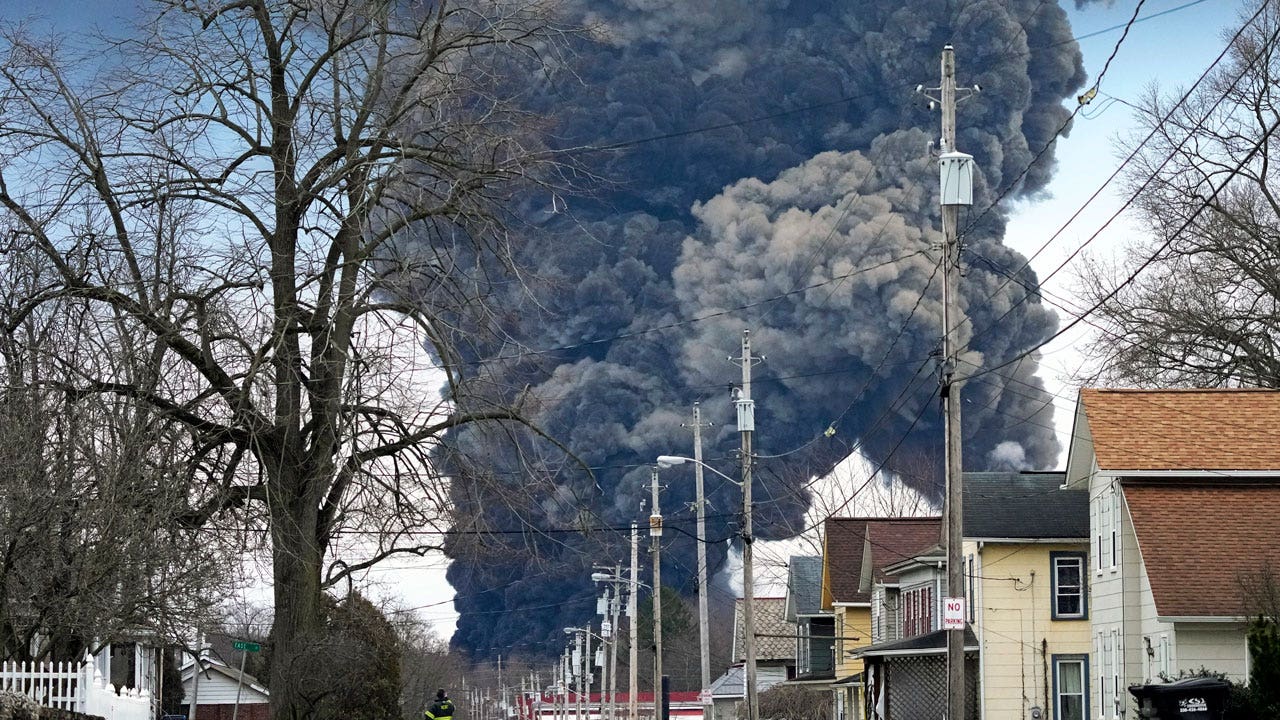The latest regarding the East Palestine toxic train derailment:
Decision to burn toxic chemicals in Norfolk Southern train cars that derailed in Ohio was made without all available information
March 7, 2024The decision to blow open five tank cars and burn the toxic chemical inside them after a freight train derailed in Eastern Ohio last year wasn't justified, the head of the National Transportation Safety Board told Congress Wednesday. But she said the key decision-makers who feared those tank cars were going to explode three days after the crash never had the information they needed.
The vinyl chloride released that day, combined with all the other chemicals that spilled and caught fire after the derailment in East Palestine, Ohio, have left residents with lingering fears about possible long-term health consequences.
Experts from the company that made the vinyl chloride inside those tank cars, Oxy Vinyls, were telling contractors hired by Norfolk Southern railroad that they believed that no dangerous chemical reaction was happening, NTSB Chair Jennifer Homendy said. But Oxy Vinyls was left out of the command center.
"They informed them that polymerization, they believed polymerization was not occurring, and there was no justification to do a vent and burn," Homendy said. "There was another option: let it cool down."
However, that information was never relayed to Ohio Gov. Mike DeWine and the first responders in charge, she said.
Some of this information came out at NTSB hearings last spring in East Palestine. Homendy's comments Wednesday were the clearest yet that the controversial vent-and-burn action wasn't needed. But the agency won't release its final report on what caused the Feb. 3, 2023, derailment until it holds another hearing this June.
DeWine's spokesperson Dan Tierney said it's frustrating to hear now — more than a year after the derailment — that it wasn't necessary to blow open those tank cars.
"The only two scenarios that were ever brought up were a catastrophic explosion occurring, where shrapnel would be thrust in all directions to a one-mile radius or averting that through a controlled vent and burn," Tierney said. "Nobody ever brought up a scenario where if you just did nothing, it wouldn’t explode."
East Palestine Fire Chief Keith Drabick has said the consensus in the command center was that releasing and burning the chemicals was the "least bad option."
But Homendy said they never heard Oxy Vinyls' opinion that the vinyl chloride was stable. Instead, the decision-makers relied on contractors who were alarmed by the limited temperature readings they were able to get, combined with the violent way one of the tank cars released vinyl chloride with a roar from a pressure release valve after hours of calm. Drew McCarty with Specialized Professional Services testified last spring that the tank car "frankly scared the hell out of us."
Norfolk Southern defended the decision again Wednesday and said the plan had nothing to do with trying to get the trains moving again more quickly.
"The top priority of everyone involved was the safety of the community, as well as limiting the impact of the incident," the railroad said. "The successful controlled release prevented a potentially catastrophic uncontrolled explosion."
Misti Allison, who lives with her family about a mile away from the derailment site, said the findings reaffirm what she believed to be true all along: that the vent and burn did not need to happen.
"The only justification was greed, and that Norfolk Southern was putting profits over people to get the train tracks up and running as fast as possible and to destroy whatever evidence was left," Allison said.
And most questions about the potential long-term health effects remain unanswered.
The NTSB has said that it appears an overheating bearing on one of the railcars caused the derailment. Several trackside detectors spotted the bearing starting to heat up for miles beforehand, but the temperature didn't reach a high enough level to trigger an alarm until right before the crash. That meant the crew didn't have an opportunity to stop the train.
Many residents of East Palestine are eager to move forward once the cleanup of the derailment wraps up later this year, but some are still experiencing respiratory problems, rashes and other health concerns.
Norfolk Southern has said that its response to the disaster and the aid it has offered the town has cost it more than $1.1 billion. Now an investor group that's critical of the railroad's response and the disappointing profits it has reported over the past several years is pushing to fire CEO Alan Shaw and take control of the railroad.

After East Palestine train derailment, toxic chemicals did not need to be burned off, NTSB says
The National Transportation Safety Board said the decision to vent and burn the toxic chemicals in the Norfolk Southern train that derailed in East Palestine, OH, was not justified.
Not just the residents of East Palestine:
4/05/2024
Residents of embattled East Palestine, Ohio, feel abandoned, forgotten and discarded by state and federal governments over a year after the Norfolk Southern train derailment dumped massive tons of pollutants into their community.
East Palestine's residents are not alone. In neighboring Pennsylvania, less than a mile to the east from the town, people are also describing a lackluster and frustrating response from the government at all levels, a lack of accountability from Norfolk Southern and extreme difficulties with reviving a sense of normalcy in a community where many are now developing health problems due to the train derailment.
"Our Pennsylvania constitutional rights were violated and continue to be violated," said Sheila Stiegler, an organic farmer in Lawrence County near East Palestine. "We are here with our expectations for our rights to be restored and upheld."
Stiegler and other nearby residents testified during a Senate committee hearing on the aftereffects of the derailment and burn-off of vinyl chloride, which she called "the Ohio Chernobyl."
"Is our government going to allow a corporation to get away with it?" Stiegler asked. "This has been a ping pong from one agency to another – with little resolution."
The complaints echo what residents have repeated for a year, indicating a lack of trust in Norfolk Southern, and then a loss of trust in state and federal agencies due to poor communication and officials reportedly not being responsive to their needs.
"I've spoken to [Norfolk Southern CEO Alan Shaw] – it yields nothing. He's a puppet, he's controlled by his board of directors," said Lori O'Connell, a resident of Darlington, Pennsylvania. "Nobody believes in the alphabet soup people because they don't follow through with what they say they're going to do anyhow – or you get the runaround."
O’Connell, who lives three miles from the derailment site, couldn’t get any agency to test her soil. Until she forced her way into a meeting with Gov. Josh Shapiro, who only then was forced to call upon the Environmental Protection Agency to order a test on her property.
"I'm angry at my local government, my county government, my state and my federal because the help that we have received in this township is short of nothing – nothing," O'Connell said. "It's inexcusable that, as taxpaying citizens in the state of Pennsylvania, that we should have to go through this," O'Connell said.
She read off lab results for her family that showed elevated levels of benzene, vinyl chloride and other chemicals, similar to what other testifiers noted. Her husband has developed a rare form of breast cancer since the derailment.
Locals and researchers have asked for more testing – not just air, water and soil, but testing of indoor air quality to see if any chemicals were absorbed into fabrics and materials in homes.
"Can you prove causation? No – and that’s what these companies rely on," said Rick Tsai, a chiropractor in Darlington, who has raised concerns regarding the burn-off of the vinyl chloride that spilled from the East Palestine train. That the burn-off was a choice, and one made for the sake of convenience over safety, has been an argument made since the choice was made to "drain all the cars and light them on fire in a ditch."
"All we really wanted was justice and life [as] it was before we were pretty much hit with a chemical bomb," Tsai said.

Ohio’s Chernobyl: Pollution from East Palestine still wreaking havoc in nearby Pennsylvania – NaturalNews.com
Residents of embattled East Palestine, Ohio, feel abandoned, forgotten and discarded by state and federal governments over a year after the Norfolk Southern train derailment dumped massive tons of pollutants into their community. East Palestine’s residents are not alone. In neighboring...
